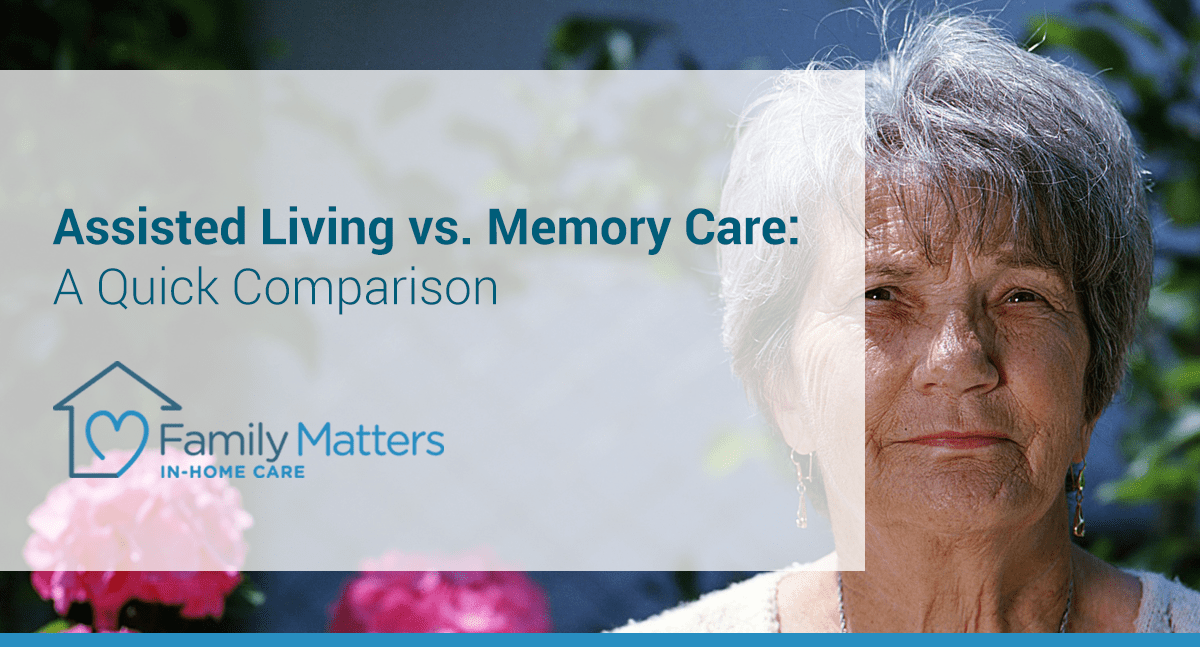
Assisted Living vs. Memory Care: A Quick Comparison
Trying to choose the right type of care for an aging loved one can be difficult. Although 90% of seniors want to stay living in their own homes for as long as possible, there may eventually come a time when the best place to receive long-term care is in a residential facility. Two common options are assisted living facilities and memory care facilities. But what is the difference between the two? Here is a brief overview to help you decide what’s best for your family.
Assisted Living
Assisted living facilities are for seniors who are generally healthy, but need some assistance with activities of daily living. This type of facility allows older adults to live independently in an individual, or shared apartment with trained staff onsite to provide assistance when needed. Staff members are available to help residents with tasks like eating, bathing, getting dressed, and medication management.
Assisted living communities typically have a shared dining area where meals are served, and most facilities include a calendar of scheduled activities and social events for residents. Additional levels of care are also available for residents who require more assistance. These services can include physical therapy, pain management, incontinence management, and increased assistance for seniors who have a high risk of falling.
Facilities usually charge a base monthly fee that includes rent and two to three meals per day. Some facilities include services such as housekeeping, laundry, and transportation in the base fee but others do not, so it’s important to fully understand the cost breakdown when considering locations. Specialized care services also cost extra. According to the U.S. Department of Health and Human Services, the cost for assisted living ranges from around $3,200 to almost $7,000 per month, depending on level of care needed and the size of the apartment.
Memory Care
Some assisted living communities have memory care units onsite, however the two types of care are not the same. Memory care is a specific type of skilled nursing care that is tailored to patients with Alzheimer’s disease, dementia and other types of memory problems. Staff members provide highly supervised care are trained on the nuances of assisting dementia patients with daily tasks such as bathing, getting dressed, eating and medication management.
Memory care communities provide meaningful and stimulating activities that are specifically designed to engage dementia patients and help them enjoy the highest possible quality of life. Memory care facilities are designed with extra security precautions to keep residents safe and prevent them from wandering out of the facility. Most sites also have an intuitive layout that is comfortable and easy for seniors with dementia to navigate.
Due to the increased level of specialized care and higher staff ratio, memory care facilities usually cost significantly more than assisted living facilities. It’s estimated that the increase is about 40% more than an assisted living facility.
Choosing the Best Care Option
Deciding between an assisted living and memory care community will most likely depend on whether dementia or Alzheimer’s is an immediate concern. If it is, a memory care facility may be the best option as they are equipped to provide your loved one with the specialized care they need.
If your loved one is still relatively independent, an assisted living facility might be the more appropriate option. However, moving can be extremely difficult for older adults, so you might consider selecting a facility that has a memory care unit onsite in case dementia care is needed in the future.
In-home care is also a great long-term care option that allows seniors to stay living in the comfort of their own home. Contact Family Matters In-Home care today for a free consultation to see how we can support your family. We can help evaluate your loved one’s needs and are able to provide assistance from a few hours a day to full-time, 24/7 care.
